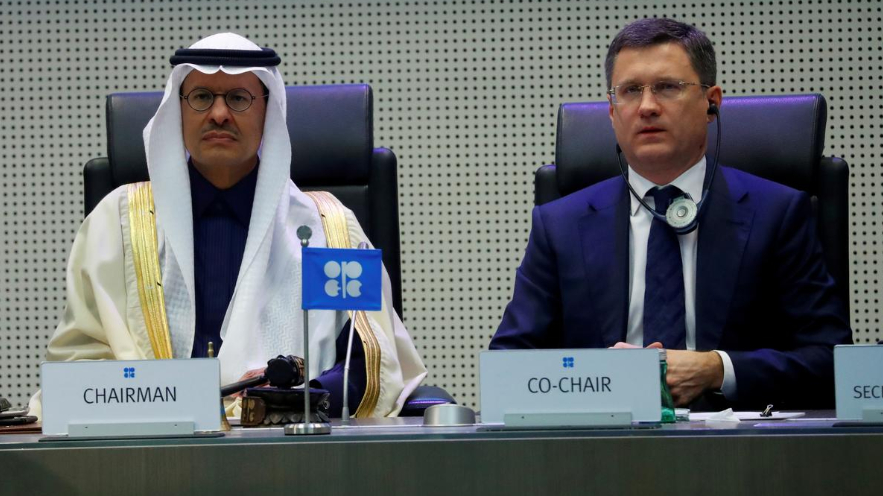OPEC and Russia have postponed a Monday meeting to discuss oil output cuts until April 9, OPEC sources said on Saturday.
The delay came amid pressure from U.S. President Donald Trump for the Organization of the Petroleum Exporting Countries led by Saudi Arabia and its allies, a group collectively known as OPEC+, to urgently stabilize global oil markets.
Oil prices hit an 18-year low on March 30 due to a slump in demand caused by lock downs to contain the coronavirus outbreak and the failure of OPEC and other producers led by Russia to extend a deal on output curbs that expired on March 31.
OPEC+ is working on a deal to cut the production of oil equivalent by about 10 percent of world supply, or 10 million barrels per day, in what member states expect to be an unprecedented global effort including the United States.

Saudi Arabia's Minister of Energy Prince Abdulaziz bin Salman Al-Saud and Russia's Energy Minister Alexander Novak are seen at the beginning of an OPEC and non-OPEC meeting in Vienna, Austria, December 6, 2019. /Reuters
Saudi Arabia's Minister of Energy Prince Abdulaziz bin Salman Al-Saud and Russia's Energy Minister Alexander Novak are seen at the beginning of an OPEC and non-OPEC meeting in Vienna, Austria, December 6, 2019. /Reuters
Putin, speaking on Friday during a video conference with government officials and the heads of major Russian oil producers, said the first reason for the fall in prices was the impact of the coronavirus on demand.
"The second reason behind the collapse of prices is the withdrawal of our partners from Saudi Arabia from the OPEC+ deal, their production increase and information, which came out at the same time, about the readiness of our partners to even provide a discount for oil," Putin said.
OPEC sources, who asked not be identified, said the emergency virtual meeting planned for Monday would likely now be postponed until April 9 to allow more time for negotiations.
OPEC sources later downplayed the Saudi-Russia row, saying the atmosphere was still positive, although there was no draft deal yet nor agreement on details such as a reference level from which to make the production cuts.
"The first problem is that we have to cut from the current production level now, not to go back to the one before the crisis," one of the OPEC sources said. "The second issue is the Americans, they have to play a part."
Oil recovered from this week's lows of 20 U.S. dollars per barrel with Brent settling at 34.11 U.S. dollars on Friday, still far below the 66 U.S. dollars level at the end of 2019. Prices had their biggest one-day gain ever on Thursday when Trump said he expected Russia and Saudi Arabia to announce a major production cut.
(With input from Reuters)